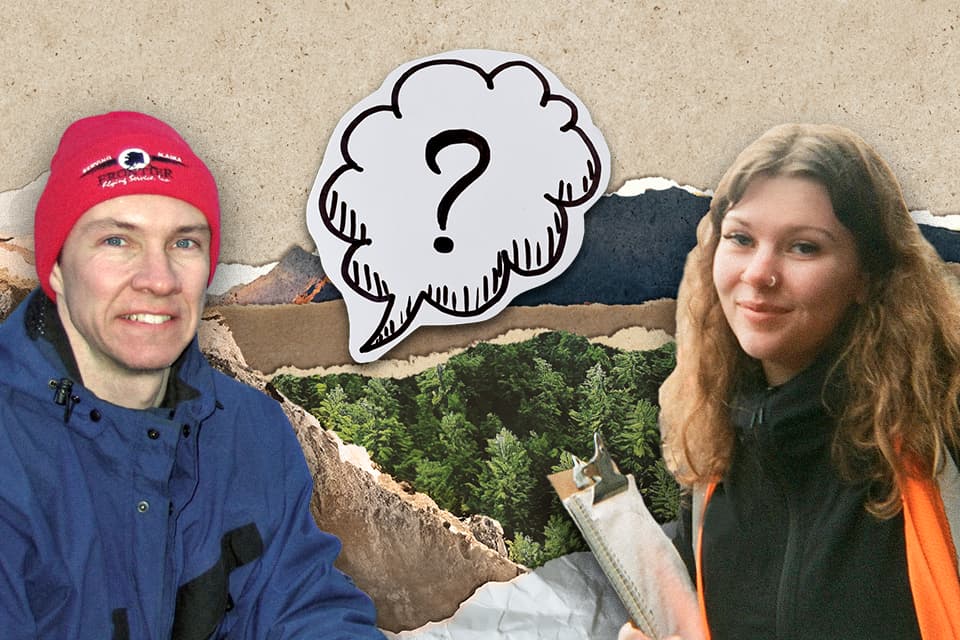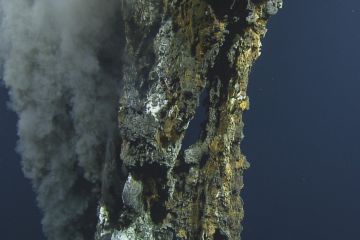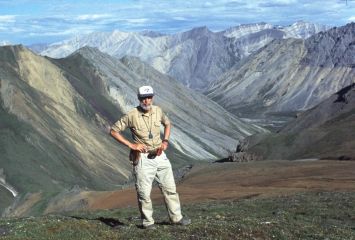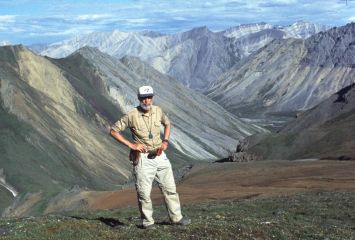Q&A: Fresh perspectives on our unique BSc in Climate Science
- Nicole Crozier

In a world where the climate crisis is intensifying, UVic’s new Bachelor of Science in Climate Science program welcomed its first students in Fall 2023. The new program allows students to learn about the complexities of human-induced climate change, while preparing them with the essential skills for transforming their knowledge into tangible actions.
This joint program, offered by the Faculty of Social Sciences and the Faculty of Science, stands as the first-degree program of its kind in North America, and the first on North America’s West Coast to be accredited for delivering on the United Nations’ Sustainable Development Goals (SDGs).
At the end of the fall term, we sat down with Camryn Thompson, a fourth-year Science student studying climate science, and David Atkinson, chair of the geography department and co-developer of the program, to learn more about the program and their experience.
Why study climate science at UVic
Who should study climate science?
David Atkinson: The BSc in Climate Science is great for those who enjoy science and want to help people.
More specifically, it’s for students who are tired of being told what to think about the "Climate Question" and want to take that next step to understand how the climate system operates, how to analyze and present weather and climate data. Perhaps most importantly, it’s for students who want to learn how to apply these skills and understanding to help organizations and communities make a difference in the climate crisis.
Ultimately, the program represents the perfect merging of the science approach that understands the world through math and numbers with the social science world that engages with the world around us to understand and respond to the needs of society.
As faculty, why was it important to you to create a climate science program at UVic?
Atkinson: It started when we realized that all the right pieces were already in place and that, with a bit of imagination, we could package these parts into a great new program.
We have a number of people on campus who research climate from different perspectives, and I am a weather researcher who focuses explicitly on understanding how weather affects human operations. Many of my grads are currently working in the environmental consulting sector doing exactly the type of work this new program will train people for.
Once we looked around and realized there is no other program like it in North America, combined with the support at UVic for community-engaged learning and co-op, we knew we had to go for it.
As a student, why did you choose to study climate science?
Camryn Thompson: My longstanding interest in Earth systems and their interconnectedness with daily life, particularly in the context of changing climate, led me to choose the climate science program.
I had the opportunity to work for a development group as a Sustainability Intern last summer, which gave me exposure to working within an environmental, social and governance (ESG) framework. This experience provided me direction and helped me make the decision to switch into the climate science program.
This program will provide me with a comprehensive perspective, offering the tools necessary to identify climate challenges and apply scientific methodologies to formulate solutions.
What you’ll learn in the climate science program
What will students learn in the climate science program? What aspect of the program are you most excited for students to learn about?
Atkinson: Students start out with a suite of science and math foundation courses that lead into courses about things like atmospheric dynamics.
Unlike other meteorology programs, however, we move into analysis and statistics courses, working in parallel to hone computer skills. That is different enough, but the most exciting aspect for me is the capstone experience where students will work directly with stakeholders out in the world to help them address climate-related questions affecting their operations.
What’s something you’ve learned that you’ve found really interesting while taking this program?
Thompson: In EOS 325, Earth System Modelling, we delved into the complexities of modelling the carbon cycle and other Earth systems. This experience has expanded my knowledge of Earth system’s driving factors through models, enhancing my understanding of the dynamics within our environment.
This course has also advanced my coding abilities, which is a valuable skill in climate science.
Hands-on learning
What types of hands-on learning opportunities are available to students in the program?
Atkinson: The BSc in Climate Science is part of UVic's highly organized co-op program, second to none in the country. Many of the courses have laboratory components where emerging skills are directly practiced.
Students participate in hands-on experiments to understand physical climate processes, such as learning how to program and install an automatic weather station, using advanced computer coding to analyze and present data about atmospheric patterns, sea ice trends, stream flow extremes, and other environmental data, and examining Indigenous ways of understanding weather and climate.
Once equipped with a broad suite of physical science, communications, and analytical skills, the capstone experience course then offers students an opportunity for direct engagement with external stakeholders in the real world.
Tell me about a hands-on learning experience you’ve had in your program, or one you’re really excited about participating in.
Thompson: Engaging in outdoor lab work for various courses has offered me hands on experience that synthesizes course content with real-world surroundings. These experiences have given me practical skills in data collection, utilizing measurement tools, and interpreting findings in the field.
In one of my labs, for example, we set up local weather stations that we monitored daily for a month. Various factors that could influence the data were taken into account, such as proximity to buildings, overhanging trees, shade, and so on. We then assessed our data based on alignment with that of fellow students and nearby weather stations in the Vancouver Island school network.
Career opportunities in climate science
What types of career opportunities are available for climate science graduates?
Atkinson: There are many opportunities for graduates from this program.
We offer two separate streams: climate impacts, adaptation and mitigation (IAM), and physical climate science (PCS).
The IAM stream is more for those interested in learning how to bring their climate and analysis skills to bear on real-world problems; grads from this stream would work with climate consulting firms on teams that are engaging with organizations to help them understand their climate needs.
The PCS stream is geared towards those wanting to focus more on climate analysis work without necessarily engaging the public, such climate research support or environmental technician.
Where are you hoping your climate science degree will take you?
Thompson: My decision to pursue a degree in climate science was driven by my desire to contribute meaningfully to the climate science community. Recognizing the urgency of addressing climate challenges, I aim to play an active role in advancing our collective understanding and finding pragmatic solutions.
I believe that with the right knowledge and actions, we can make an impact on the Earth’s trajectory. I hope to work towards a more sustainable and resilient future.
Find the program that works for you
Interested in the Bachelor of Science in Climate Science program? Discover climate science program details, get application guidance, and explore opportunities to make a positive impact today.
From physics to biology, geography to earth and ocean sciences, UVic has over 25 degree, diploma, minor and certificate programs to tackle our planet's biggest challenges.
Photos
In this story
Keywords: climate, sustainability, education, environment
People: David Atkinson, Camryn Thompson





